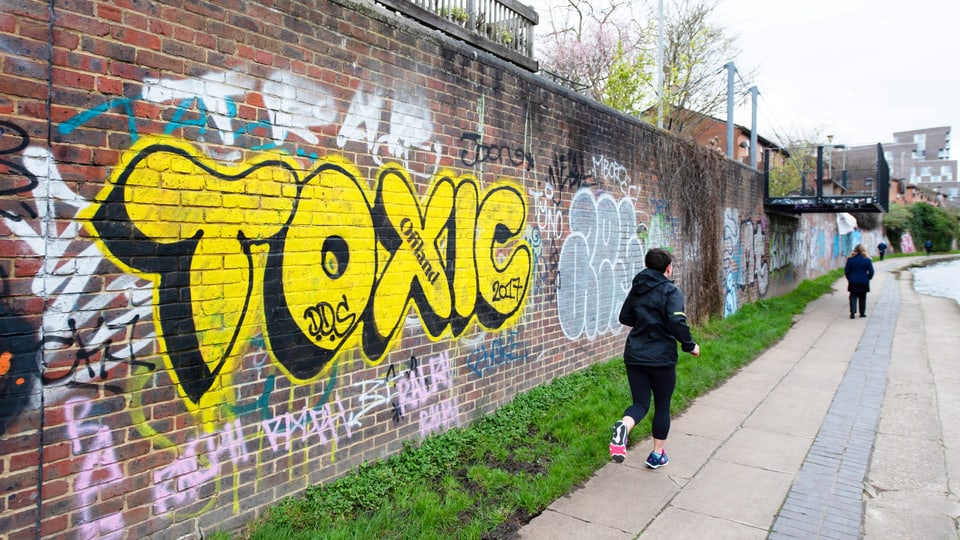
Talk about mental health? Yes please – but do it right – Culture
We talk about our “inner child,” identify “narcissistic traits,” or are “depressed” instead of feeling bad. The amateur psychologist in us is currently booming. The so-called therapy language, shaped by decades of psychological knowledge and advances, is creeping from the therapy chair into our everyday language, into social media, and into public discourse.
If we assume that language shapes our thinking: What happens in our heads when we are no longer just agitated but also “triggered”, when situations are not only unpleasant but also “toxic”?

Legend:
Poisoned language? What used to be simply “bad” is now often “toxic”.
Getty Images / John Keeble
Behind podcast titles like “Goodbye triggers, hello healing!” or “Free your wounded soul” you can find experts and self-proclaimed mental health influencers who chat about resolving trauma and calming the nervous system. Books, series and conversations among friends are also competing to analyse and diagnose.
Therapists are increasingly turning to the “therapy generation” via Instagram or Tiktok, sometimes with educational work, sometimes with fortune cookie wisdom. The New York Times calls them “the new Instagram poets”. Their poetry: “More hugs, less advice” or “Dear little me, you’ve taken on so much that you shouldn’t have”. Including: encouragement, education and yes, advice.
Talking about mental health
What does “therapy speak” do to us? If you ask Frank Jacobi, professor at the Berlin School of Psychology, he speaks of two sides of the same coin.
“The fact that mental health is a much greater focus as part of our health is a good development,” he says. “It has to do with emancipation, with informed patients, with autonomy.” Jacobi speaks of a higher level of “mental health literacy” and by this he means that many people are more familiar with the basics of the soul and can read the psyche better.
There should be neither oversensitization nor overdiagnosis.
A look at mental health in this country: Two out of five people in Switzerland say they are mentally stressed. This is the result of a survey conducted by the Pro Mente Sana Foundation in 2022. Every second disability pension can now be traced back to psychological causes. Young people in particular are increasingly suffering from mental disorders. This is shown by the statistics of the Federal Social Insurance Office (FSIO) from 2022.
Many people in Switzerland are affected. So should we talk about mental health? Yes, please – but do it properly and carefully. This brings us to the other side of the coin. “There should be neither over-sensitization nor over-diagnosis,” says Jacobi.
Are informed people worse off?
A study from Australia shows how knowledge about mental health problems contributes to people’s poor mental health assessment. 3,000 subjects were surveyed after campaigns that provided particularly intensive information about mental illness. The result: those who knew less about mental health were also less likely to be classified as depressed.
Jacobi is also amazed by the result. “It cannot be the point that education can have a side effect that you feel worse afterwards. In my opinion, education leads to prevention.”
But does knowledge about mental impairments lead to people discovering more symptoms in themselves? Or, conversely, do those affected know more about the issue because they are affected? What is cause and what is effect? The study does not say that.
Incorrect use devalues the suffering
The fact is: mental disorders are no longer taboo when we talk about them. It can therefore be useful to learn terms to help you identify problems in yourself or others and to be able to name phenomena more specifically. However, many terms from therapy language have their meaning in the context of a diagnosis.
This is where things get tricky. By using terms that are intended to describe severe suffering incorrectly or excessively, the words lose their conciseness and ultimately their meaning. This also devalues the suffering that victims have to endure.
Rejection is not necessarily a traumatic event
Take trauma, for example. It was assumed that war veterans in particular were traumatized. In the First World War, for example, people spoke of the so-called shell shock syndrome. Five years after the Vietnam War, in 1980, this assumption became a psychological fact: post-traumatic stress disorder (PTSD for short) was officially included in the diagnostic catalog of mental disorders.
You have to be careful not to turn normal problems into mental illnesses.
But it wasn’t just war that traumatized people. Natural disasters, accidents, abuse: all of these terrible events could trigger strong emotional reactions that were classified as traumatic. Psychology therefore expanded the concept of trauma in a comprehensible way.
But the term is now increasingly used ironically – or for things that are just unpleasant. But rejection is not automatically a traumatic event. An “asshole” is not the same as a pathological narcissist. Not every emotional impulse is anxiety. And a difficult phase in life does not necessarily lead to a depressive period.
Be careful when assessing
“If we immediately classify everything as a mental disorder, we’re overshooting the mark,” says Jacobi. “We have to be careful not to turn normal problems into mental illnesses.”
So how helpful is this “therapy language” for society? “Psychologically, it doesn’t help if you label things that are actually normal in life with psychopathological terms,” says Jacobi.

Ethel Purdy – Medical Blogger & Pharmacist
Bridging the world of wellness and science, Ethel Purdy is a professional voice in healthcare with a passion for sharing knowledge. At 36, she stands at the confluence of medical expertise and the written word, holding a pharmacy degree acquired under the rigorous education systems of Germany and Estonia.
Her pursuit of medicine was fueled by a desire to understand the intricacies of human health and to contribute to the community’s understanding of it. Transitioning seamlessly into the realm of blogging, Ethel has found a platform to demystify complex medical concepts for the everyday reader.
Ethel’s commitment to the world of medicine extends beyond her professional life into a personal commitment to health and wellness. Her hobbies reflect this dedication, often involving research on the latest medical advances, participating in wellness communities, and exploring the vast and varied dimensions of health.
Join Ethel as she distills her pharmaceutical knowledge into accessible wisdom, fostering an environment where science meets lifestyle and everyone is invited to learn. Whether you’re looking for insights into the latest health trends or trustworthy medical advice, Ethel’s blog is your gateway to the nexus of healthcare and daily living.



